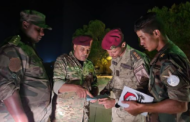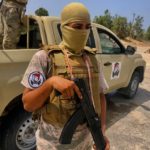Feb. 2, two Haftar-backed militias clash in Sirte after attack on Al-Kaniyat Brig. HQ by the “Tariq bin Ziyad” brigade, run by Haftar’s son, Saddam..
Feb. 5, LPDF assembled in Geneva elects new National Unity Government, cabinet vows to maintain close relations with Turkey.
TRIPOLI
- Feb. 2, the Chief of General Staff of the Libyan Army, Lt. Gen. Muhammad Al-Haddad, met with the United Kingdom’s military attaché, Colonel Mark Yaven, to discuss cooperation mechanisms between the two countries in various fields. The meeting took place at the Naval Base in Tripoli and dealt with means for providing support to the Libyan army, especially with regard to mine clearance operations, and assisting in the DNA process to identify victims of the mass graves committed by Haftar’s militias during their aggression against the region;
BENGHAZI
- Feb. 7, a dangerous child-kidnapping ring was dismantled in Benghazi after carrying out several crimes. The masked gang members arms in hand, would use a red-coloured KIA car to kidnap children;
- Feb. 2, an official statement announced that Misrata International Airport will soon resume passenger flights to Benina Airport in Benghazi after a 6-year hiatus;

HUN
- Feb. 7, locals organized a protest in front of the headquarters of city hall to protest the authorities’ failure to fulfill their demands to evacuate all mercenaries from the city, following the killing of local resident Ayman Abu Qusasa at the hand of the mercenaries;

SIRTE
- Feb. 2, two groups of fighters from Khalifa Haftar’s forces clashed in Sirte after an attack on the headquarters of the 9th Brigade (Al-Kaniyat) was carried out by the “Tariq bin Ziyad” brigade, run by Haftar’s son, Saddam. Sirte-Jufra Operations Room spox. Abdelhadi Drah said the GNA Army was monitoring the clashes in Sirte but received no reports of casualties or the reasons behind the fighting. Sources from Sirte reported that Saddam’s “Tariq bin Ziyad” brigade attacked Al-Kaniyat headquarters in support for the military police of Haftar’s forces that were trying to detain some wanted Al-Kaniyat members for armed robberies in Sirte;
PETROLEUM FACILITIES GUARD
- In a Feb. 2 letter to PM Al-Serraj, NOC head Sanalla called for the immediate payment of the delayed salaries of the eastern-based members of the Petroleum Facilities Guard (PFG). Sanalla stressed that the release of the salaries will ensure the secure and safe continuation of oil exports without any further delays that would affect the country as a whole.

INTERNATIONAL RELATIONS
- Feb. 7, the new Prime Minister, Abdul Hamid Dbeibah stated that Libyan representatives in Geneva chose peace, progress and democracy over war and division. He promised that his government will abide by a principle of transparency and honesty to Libyan people, vowing to work on reducing the country’s centralization to strengthen its sense of solidarity. He also pledged to resolve Libya’s growing electricity crisis within just six months and expedite the process of providing the public with COVID-19 vaccines as soon as possible. He pointed out that the pressing issue of the liquidity crisis that has held the country in economical limbo for years is already underway to being resolved and he will work with relevant parties to make certain the solution is permanent for the sake of the Libyan people. In regards to foreign affairs, Debiba promised to work on developing relations with Libya’s allies so long as they do not interfere with Libyan affairs and Libya’s government will not interfere with theirs;

- Feb. 7, new UNSG envoy and UNSMIL head, Ján Kubiš was officially introduced to the LPDF by outgoing acting UNSMIL head, Stephanie Williams, a day before officially taking office. Kubiš was present in Geneva over the weekend during the selection of Libya’s new Government of National Unity (GNU). Again Feb. 7, he talked with outgoing GNA’s PM Faiez Serraj and FM Mohamed Siyala;
- Feb. 7, the president-elect of Libya’s new Presidential Council, Mohammad Menfi, talked on the phone with Russia’s Deputy FM, Mikhail Bogdanov about the present Libyan and regional files. Bogdanov expressed his hope for the transitional leadership to become an important landmark on the path to overcoming the present Libyan crisis;
- Feb. 7, French president Macron had a congratulatory telephone call with Menfi and invited him to visit Paris as soon as possible;
- Feb. 7, Yasin Aktay, advisor to the Turkish President, confirmed that the new Libyan executive authority, headed by PM-elect Dbeibah, will support Ankara’s role in Libya, and all of Libyan-Turkish agreements signed by the GNA will remain valid, including those providing for Turkey’s military presence and training in Libya;
- Feb. 7, Italian authorities allowed rescue vessel Ocean Viking to dock at the Augusta port in Sicily with 422 migrants from Libya onboard. The migrants were allowed to disembark in Italy following distress calls made by the boat in wake of a recent storm. The rescue ship is operated by the NGO “SOS Mediterranée”;

- LNA commander, Khalifa Haftar “accepted” the results of the Libyan Political Dialogue Forum (LPDF), which resulted in the election of the new GNU, Haftar’s spokesman, Ahmed Al-Mismari declared Feb. 6;
- Feb. 6, the spokesman of the Tripoli-based House of Representatives (HoR), Asaad Al-Shirta has confirmed that the parliament is seeking to hold a full-quorum session to debate on granting confidence to the new GNU and approve its work plan and budget, consistently with realier declarations by HoR speaker, Aguila Saleh;
- Feb. 6, Turkey’s president Erdoğan criticized recent calls made by France’s President Macron to withdraw Turkish troops from Libya. Erdoğan said: “There are mercenaries who came from Chad, or Mali, where France has invaded. Macron needs to look at these countries first”;
- Feb. 5, after a first-round vote which failed to reach the required quorum, the LPDF assembled in Geneva elected a new Government of National Unity: the winning list of candidates featured Libya’s former ambassador to Greece, Mohamed Menfi as president-elect of the Presidential Council; Musa Al-Koni and Abdullah Al Lafi as his deputies; and Misrata-born Abdul Hamid Dbeibah as prime minister. Several countries congratulated the newly elected cabinet, which within 21 days must receive a vote of confidence by the Tobruk-based House of Representative before being officially sworn in;

- Feb. 5, the UNSC directed Secretary-General Guterres to begin preparations to deploy non-military ceasefire monitors to Libya;
- Feb. 4, the Commissioner for Peace and Security of the African Union, Ismail Sharqi, called on the LPDF to focus on forming the executive authority and that nothing should distract them from the UN-led process;
- Feb. 4, the Head of the High Council of State, Khalid Al-Mishri, withdrew his candidacy for the new Presidential Council of the unified executive authority, declaredly to allow “a bigger accord”, vowing in a video statement to double efforts to provide the needed support to hold elections on December 24, 2021 as per the LPDF’s roadmap;
- Feb. 4, Libyan Mufti, Al-Gharyani criticized the ongoing LPDF meeting in Geneva, saying its members do not represent the Libyan people as they were selected by the UNSMIL based on its own criteria, which he said was a very serious flaw;
- Feb. 4, Former Minister of Justice, Salah Marghani called on the Libyan authorities not to sign the maritime border demarcation agreement with Italy. He stated: “The demarcation of the maritime border agreement with Italy must be signed by a strong and stable Libyan state with a legitimate government that is nationally recognized. It is not permissible for the Italian government to try to force this on the outgoing GNA, which lacks legitimacy, or even on the upcoming interim national unity, as it has no jurisdiction to sign such agreements.”;
- Feb. 4, the GNA Minister of Labour and Rehabilitation met with Tunisian ambassador to Libya, Al-Asaad Al-Ajili in Tripoli. During the meeting it was made known that Libya is seeking Tunisia’s help in vocational training and in supplying workers to the fishing, agricultural and health sectors;
- Feb. 4, the GNA Undersecretary for Health met with the ambassador of North Korea in Tripoli. During the meeting it emerged that Libya is seeking cooperation with North Korea in the health sector. The Health Ministry reported that the meeting discussed the possibility of bringing in medical and medical assistance to fill the huge shortage in some medical specialties, especially in southern Libya;
- Feb. 4, the Syrian Observatory for Human Rights (SOHR) said seven Syrian mercenaries recruited by Russian Wagner Group and sent to Libya to secure oil facilities were killed in a mine explosion that blasted their vehicle. It was the first time Wagner Group mercenaries, whom Russia continues to send to Libya, got killed, SOHR pointed out;
- Feb. 2, SOHR confirmed that the recruitment of mercenaries from Syria to Libya is still ongoing, despite international calls for their expulsion from Libya. In a statement, SOHR stated that the recruitment process was taking place in Idlib, and the northern countryside of Aleppo and Afrin through brokers. Recruits are offered financial incentives with a monthly salary of USD 400 under the pretext of securing facilities in Libya.

- Feb. 2, Italian ambassador to Libya, Giuseppe Buccino submitted to the GNA Foreign Ministry a draft project for maritime demarcation between the two countries, asking for considering signing the agreement. Buccino handed as well a MoU proposal for cooperation in digital technology in public services to improve communication between citizens and government institutions;
- Feb. 2, UNICEF expressed concerns over the deteriorating water, sanitation and hygiene (WASH) situation in Libya, warning that over 4 million people, including 1.5 million children will face imminent water problems if immediate solutions are not found and implemented;
- Feb. 1, IRINI commander, Vice Admiral Fabio Agostini stated IRINI is an important tool for setting up a final end to the present armed conflict in Libya, and it is ready to play a pivotal role in monitoring any ceasefire agreement, if so requested by the UN and the Libyan authorities, with the approval of EU countries;

- Feb. 1, it was reported that the Amazigh Supreme Council (ASC) in Libya had rejected the planned referendum on the country’s draft constitution in the regions and cities affiliated to the ASC, stressing that the ASC is not bound by any results of this referendum;
- Feb. 1, several members of the Libyan Political Dialogue Forum (LPDF) demanded the exclusion of candidates for the positions of Prime Minister and the Presidency Council of the upcoming Interim Executive Authority, who currently hold senior government positions.

























